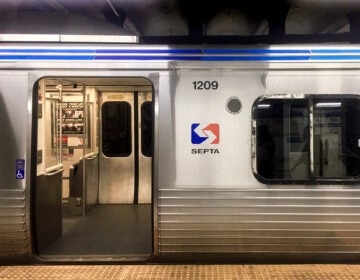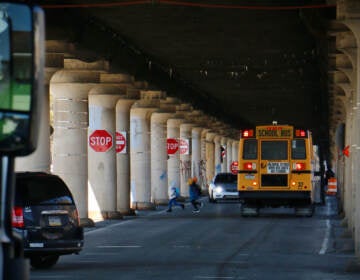Special-ed cuts won’t hurt students, Philly school officials say
The Philadelphia School District laid off 157 special-education classroom assistants and one-to-one aides last week in a move that officials say won’t negatively affect children.
School advocates in the legal community, though, remain highly dubious.
Chief financial officer Matt Stanski explained the district’s rationale to the School Reform Commission at a June 30 meeting.
“We believe we can maintain existing services for our special-education students and, in fact, enhance them through management efficiencies and still see this expenditure reduction,” said Stanski.
During his testimony, Stanski specifically thanked SRC Commissioner Sylvia Simms, a former special-education bus attendant and founder of the advocacy group Parent Power.
“Her advice and support has led to significant savings in that area,” he said.
The layoffs break down in two sets.
The first concerns positions the district argues have been overcompensated based on a now irrelevant “special assignment” designation. The district has invited those laid off in this category to reapply for less lucrative positions as they become available.
The number of new open positions will depend on 2014-15 student enrollment.
With the “special assignment” designation, employees were earning more than $40,000. The reclassification will bring top salaries down to less than $30,000.
“Those individuals will have the qualifications that are necessary for those positions,” said district spokesman Fernando Gallard.
He said that the Philadelphia Federation of Teachers wouldn’t allow the district to reclassify the positions without making layoffs.
“The only way to reclassify the salaries for these positions, unfortunately, was to move forward with the layoffs,” he said.
The other set of layoffs concerns merging some one-to-one aide positions with special-education bus attendant positions.
“Instead of having two individuals doing two specific different jobs, we are combining the two jobs under one individual,” said Gallard.
In total, the district’s 2014-15 budget includes $5.5 million in cuts to special education — $1.4 million from the reclassification of positions. The remainder comes from the mergers, as well as the elimination of 20 special-education teaching positions that had yet to be filled.
Despite the cuts, the district expects to meet the terms of every child’s legally mandated individualized education plan.
Gallard said the district is “100 percent committed” to providing students the services that their IEPs require.
Keeping tabs on school district
Sonja Kerr, director of disability rights at the Public Interest Law Center of Philadelphia, doubts that the district can deliver on that promise.
“We, frankly, just don’t see how that’s going to happen,” said Kerr. “As we speak, we have clients right now who didn’t have aides last year, who aren’t getting the services they’re supposed to … even though the paperwork, the IEP, says they’re supposed to happen.”
By providing one-to-one assistance to children who would otherwise struggle to keep up in general education classes, advocates say aides allow special-education students to integrate with their peers.
Kerr warns that further service reductions will lead to costly lawsuits over special education.
“We think it’s very shortsighted because in the end, most of the time, if the child’s IEP says the child is supposed to get certain services, and the child doesn’t, the district isn’t going to win that case,” she said.
Gallard said that each special-education complaint must be investigated on a case-by-case basis.
Kerr says the district should better shield special-ed students, whom she called “our most vulnerable kids,” from its ongoing budget crisis.
“If the district can’t provide the services, the district should say so,” she said. “And it should say so clearly to the [Pennsylvania] Department of Education, which has a responsibility also.”
Advocates also worry that the “layoff and rehire for less” plan will dissuade the best assistants from returning to the district.
In a letter addressed to Superintendent William Hite and SRC Chairman Bill Green, Kerr asked if the $5.5 million cut would violate the district’s “maintenance of effort” requirement under the federal special-education law (IDEA).
District spokesman Gallard said he could not yet explain the district’s position regarding federal maintenance of effort requirements.
Kerr said PILCOP was “feverishly working” on a lawsuit against the district and the state based on the lack of resources provided to the general and special-education populations in Philadelphia’s public schools.
“The state is aware of these problems. It’s taking no action, and the state knows better,” Kerr said. “We’re going to keep holding their feet to the fire.”
WHYY is your source for fact-based, in-depth journalism and information. As a nonprofit organization, we rely on financial support from readers like you. Please give today.





